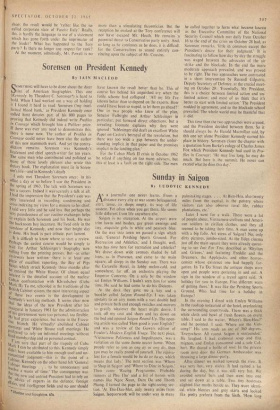Sorensen on President Kennedy
By LAIN MACLEOD CI OM ETHING will have to be done about the sheer 1,3size of American biographies. This one (Kennedy, by Theodore C. Sorensen*) is hard to hold. When I had worked out a way of holding it I found it hard to read. Sorensen ('my intel- lectual blood bank,' as President Kennedy once called him) devotes part of his 800 pages to proving that Kennedy did indeed write Profiles in Courage which brought him a Pulitzer prize. If there was 'ever any need to demonstrate this, there is none now. The author of Profiles in Courage could never have been also the author of this new mammoth work. And yet the contra- diction remains. Sorensen was Kennedy's lieutenant and chief speech-writer for ten years. The same man who contributed and polished so many of those lovely phrases also wrote this dreary book. The explanation must lie in Soren- sen's life--and in Kennedy's death
only met Theodore Sorensen once: in. his office a day or so before I saw the President in the spring of ,1963. The talk with Sorensen was not a success. Indeed it was scarcely a talk at all. I had the impression that the President's aide was °Illy interested in recording, condensing and cross-indexing my views for a minute to his chief. I said very little and he said less. But perhaps the very pointlessness of our routine exchanges helps to explain both Sorensen and his book. He was the backroom boy incarnate. He lived only in the sunshine of Kennedy, and now that bright day is done. His book is part tribute, part lament.
It is difficult to know where to start a review. Perhaps the easiest course would be simply to wait for Arthur Schlesinger's biography now r°11ing from the printing presses. But---as other reviewers have written--there is at least one Piece of excellent reporting, the Bay of Pigs iasco which struck Kennedy three months after he entered the White House. Of almost equal 'Merest is the detailed account of the nuclear , Luban confrontation with Khrushchev (Cuba Mark II). To me, schooled in the traditions of the uritish Cabinet system. the most interesting aspect af these two events is the development in Kennedy's working methods. It seems clear now that the ideas of the new President after his Inaugural in January 1961 for the administration his government were too personal, too flexible. ,1-?e had great experience, but none in the Execu- tive branch. He virtually abolished Cabinet meetings and White House staff meetings. He preferred to rely on informal meetings without fixed membership and on personal contact.
am sure that part of the tragedy of Cuba i!ark I can be attributed to this. Kennedy simply ,Idn't have available to him enough cool and un- :,unnnitted judgment—this is the point of a Kennedy on the other hand felt 'General ,tbinet meetings . . to be unnecessary and fl volve a waste of 'time.' The consequence was hat the new and untried President had to rely on he advice of experts in the defence, foreign iff
"airs. and intelligence fields and no one should Hodder and Stoughton, 63s. have known the result better than he. This of course lies behind his anguished cry when the futile scheme had collapsed: 'All my life I've known better than to depend on the experts. How could I have been so stupid, to let them go ahead?' One or two people who knew of the plan, Senator Fulbright and Arthur Schlesinger in particular, put forward direct objections, but a revealing footnote explains why they were ignored : 'Schlesinger did draft an excellent White Paper on Castro's betrayal of the revolution, but there was too wide a gap between the under- standing implicit in that paper and the premises implicit in the landing plan.'
For the Cuban Mark II crisis in October 1962 he relied if anything on too many advisers, but this at least is a fault on the right side. The men
he called together to form what became known as the Executive Committee of the National Security Council which met daily from October 16 to the end of the crisis on October 28 had, as Sorensen remarks, 'little in common except the President's desire for their judgment.' It is fascinating to follow how day by day the struggle was waged between the advocates of the air -strike and the blockade. In the end the more moderate approach prevailed, and was proved to be right. The two approaches were contrasted in a short intervention by Roswell Gilpatric, Deputy Secretary of Defence, at the crucial meet- ing on October 20: 'Essentially, Mr. President, this is a choice between limited action and un- limited action; and most of us think that it's better to start with limited action.' The President nodded in agreement, and so the blockade school prevailed. The whole world may be thankful that it did.
This time then the two approaches were argued, and the President decided between them. So it should always be. As Harold Macmillan said, by this one act alone President Kennedy earned his place in history. Sorensen closes the chapter with a quotation from Burke's eulogy of Charles James Fox which President Kennedy had used in Pro- ' files in Courage: 'He may live long, he may do much. But here is the summit. He never can exceed what hp does this day.'






























 Previous page
Previous page